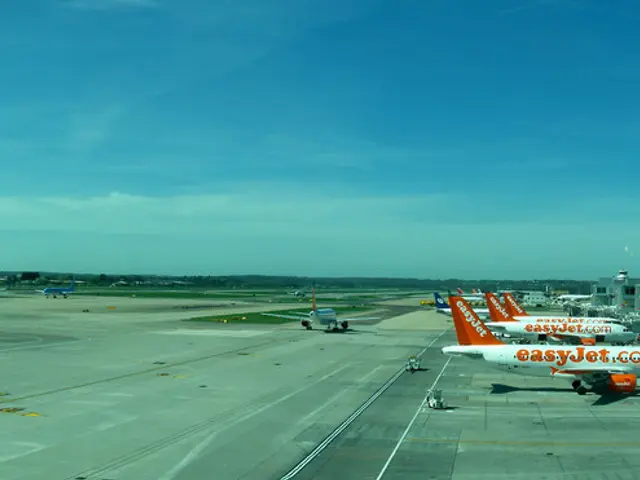Berlin Taxi Tussle: A 125-Year-Old Guild's Modern Woes
Taxi Union Commemorates Anniversary - By Engaging in Emergency Brake Maneuver - Innovation in taxi services marks its anniversary amidst brakes on progress
Let's chat about the current state of the Berlin taxi industry – a scenario that's anything but calm. "Things ain't exactly poppin'," Leszek Nadolski, the First Chairman of the Guild of Berlin Taxi Operators, said candidly. This Friday marks their 125th anniversary, but the celebrations come with a twist. Many drivers are juggling their jobs with side-gigs on Uber and co. The introduction of a fixed-price option for taxi rides last year hasn't spurred significant growth in business.
Nadolski, however, views this change positively. With the fixed-price option, passengers receive a fixed price when booking a taxi, which fluctuates within a tariff corridor based on the trip length. Gone is the nail-biting wait for the taxi meter to rise. "Customers dig the price certainty, no doubt about that," Nadolski emphasized, chair of the guild. Even Freenow, a taxi broker, recently lauded the benefits of fixed pricing in Berlin after a year's trial.
Theamanrent topic? Minimum prices! Taxi companies are forbidden to offer rides below a specific price floor, while rental cars receive a free pass. And it's creating quite the imbalance in the industry, at least from the guild's perspective. They're pleading for minimum prices for rental car platforms. "Fair competition, and better service, that's the dream," sighs Nadolski.
The Senate's examining this issue, but they're keeping mum on specifics. Likewise, the city of Leipzig set minimum fares for rental cars in 2021, leading to lawsuits. We're expecting similar legal battles in Berlin, should the Senate decide to regulate rental cars similarly.
Yet, the taxi industry seems to grab the Senate's attention. Besides considering minimum prices, the Senate Administration recently cracked down on illegal companies operating without a permit. Last year, they checked the entire vehicle fleet on Uber, Freenow, and Bolt, removing hundreds of cars. The platforms called these steps crucial, but some are now complaining about the approval process. They claim applications take too long, and rejection reasons aren't always clear. There's even talk of re-registration of fleet vehicles in smaller Berlin communities, creating a headache for local authorities and leaving the State Office for Citizens and Ordnungsangelegenheiten (Labo) out of the loop. Nadolski from the taxi guild voiced concerns about the possibly growing "shadow economy in the car rental industry." Discussions around this matter are planned at the end of June involving Berlin representatives and county councils.
Now, onto some intel about rental cars. As it stands, rental car prices in Berlin can be all over the place, depending on the time of year, vehicle type, and duration. At Berlin Tegel Airport (TXL), the cheapest rental rate typically hovers around $50.21, climbing up to $67.69 during peak months, like December[1]. In-demand vehicle types include SUVs, small cars, and vans. Rental periods usually last about 4 days, signaling a preference for medium-length rentals[1].
Swarming the Berlin taxi scene are big brands like ALAMO, ENTERPRISE, EUROPCAR, HERTZ, KEDDY, SIXT, and THRIFTY[2]. These companies offer an assortment of vehicles, catering to a wide range of travelers' needs.
Future price regulations aren't on the radar yet, but as Berlin continues to embrace eco-friendliness, environmental-friendly vehicles or emission reduction might be key focus areas for future regulations.
To score the best deals, it's recommended to use price-comparison platforms like CarJet or DiscoverCars. By comparing offers from multiple companies, travelers can save some green and choose the best option for their buck[2][4].
- The Guild of Berlin Taxi Operators, concerned about competition with rental car platforms, has advocated for minimum prices in the rental car industry, stating that fair competition and better service are their goals.
- Despite the introduction of a fixed-price option for taxi rides, the Berlin taxi industry is still facing challenges, with some drivers supplementing their income through services like Uber. This situation has led to discussions about regulating rental cars and potential minimum fares, similar to the approach taken by the city of Leipzig in 2021.








